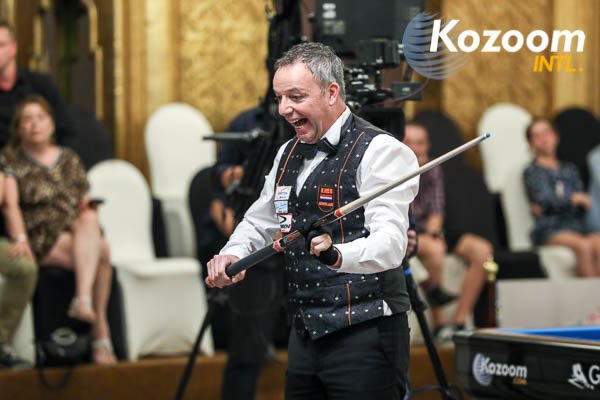The most interesting comment made by the new world champion in his interviews, was this:
"I was mentally strong this week, and that was the key to the title."
It sounds like an every-day, run of the mill thing to say for an athlete. But look a little closer. He says: "this week". The implication, the only possible conclusion is, that he is not ALWAYS on that level of mental strength. It is not a given, not a constant. It fluctuates. We may think Jaspers is all steel and granite, that Merckx can produce comebacks from 15 - 37 on sheer willpower, that Caudron has the certainty in his mind that he is about to make a run of 12. But it's not true, and these players will tell you so, if you care to listen. Even if you are a super-human billiard player, you are still one-part super, one-part human.
Jaspers had to do almost the same thing Blomdahl did in 2015. To refresh your memory: Dong Koong Kang was Torbjörn's opponent in the WC final that year (in Bordeaux), and the Korean was first to finish: 40-34. Blomdahl needed six in the equalizing inning, made them and won the shootout 2-1. Dick was in that position too: he needed four in the equalizer and three in the shootout, after Bury had made two. I think it's fair to say that DJ's and TB's achievements are comparable, on the same level. If my heart rate is anything to go by: it was at 183 both times.
There were two key shots for Dick. The third in the equalizing inning was a delicate hit, five rails with an angle that left no margin for error, just the right speed to make the cue ball come in short enough, and keep the second ball from interfering. It was the kind of shot where you are asked nine questions, and if you get eight answers right, you've missed. He had to be bloody perfect. The second key shot was the second in the shootout. A so-so break-off left him with a sensitive little short-angle, cueing slightly hampered, butt of the cue lifted, aiming to a third ball outside his vision. After he had taken that hurdle, the third and winning point looked like a formality. (It wasn't. That one was missable too).

Billiard fans all around the world were taking in those tense final minutes, enjoying every second. But something tells me that after the winning point, they did not comment on Dick's ability to judge an angle or hit a ball thin from distance. They were commenting on his "mental strength".
As if he had just proven to be mentally strong, by making that run of four, then that run of three. You know what? I disagree.
Dick's cue ball was desperately close to the second ball but the angle at least gave him a chance. Change the position of the yellow by three millimeters and the shot goes from "very difficult" to "virtually unmakeable". Should that have changed our verdict on his mental capacity? I don't think so.
Judging a player's mental strength by his success is a dangerous thing to do. Bury did not lose that final because he "gave up" or broke down mentally. I saw a player who had plenty of fighting spirit from the first to the last minute. He lost (and so did Dong Koong Kang) because the other guy was a better player. It's easy to confuse ability and mentality, and we are often in danger of giving too much weight to the second, not enough to the first.
To complicate matters further: World Championships are not always won by the best player. It's just four days, it's only forty points. Play to sixty in a Round Robin, and the best player will end up on top, for sure. But in our current format, Lady Luck plays an important role and all sorts of small things can happen with major consequences. Dani Sánchez was a much better player than Ryuuiji Umeda in 2007, and he also played a better tournament that year in Cuenca (1.805 for the Spaniard, 1.426 for the Japanese). But Umeda won the final and with it, the world title. The shoe was on the other foot in 2010 , when one better decision by Leppens could have given him the world title. He chose wrong and lost 15-12 in the fifth set to Sánchez.
Did Sánchez beat Leppens, did Blomdahl beat Dong Koong Kang, did Jaspers beat Bury because of a better mentality, or because of greater ability? Was it, in your opinion, strength of character, nerve, killer instinct, mental toughness? It gives us a better storyline if it is, it's more heroic, romantic. But if the answer is yes, then what about Umeda? If the answer is yes, then what about that match where one of the mentally toughest guys of all time (DJ) had a 44-7 lead and lost the match?
3-cushion is a mercurial, unpredictable, cruel and sometimes downright unjust game. Don't judge the players too hard, people. We are in a comfy chair, looking at a monitor. They are in the ring, taking the punches.
